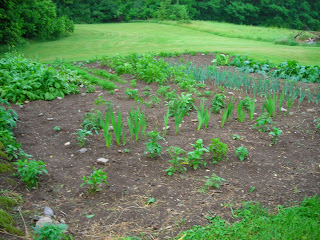Abundant
rain kept me out of my garden. After the wet spell, I strolled out to take a
proud view of my neat rows. I saw a carpet of thick, tall weeds carpeting the
ground. “I must have been mistaken,” I thought. “I must have imagined that I
weeded and hoed this garden a week ago. It could not have been this garden that I so carefully tended.
Maybe I accidentally weeded and hoed someone else’s garden.”
 |
| Garden Coming Along on June 21st |
 |
| Garden After Third Massive Weeding |
I struck
the hoe over and over against tough roots. I bent low over rows to pull huge
pigweeds from amid the potatoes. I could not believe that, for the third time
this year, I was involved in a monstrous weeding, as if the previous two
weedings had been for nothing.
Next year,
before I order seeds, I will read my blogs. Maybe I will become a regular
customer at the farmer’s market and will skip gardening. What joy is there in
repeating exactly the same hard work of a week ago?
The fact
that many of my seeds had not sprouted in the first place was haunting me now.
Large gaps were not shaded by the leaves of vegetables and had to be hoed
smooth. Not far from where I live is a perfect garden of about the same size as
mine. It stands so near the road that I am forced to look upon it. The rows are
as straight as a ruler, the plants are spaced exactly alike down the rows, the
stakes have the same height throughout and do not lean, and the weeds—well, there
are none. What gardener has the patience and the good luck to have a garden
like that? I would ask the owner if I could take a picture to post online, but
I fear that the obsessive compulsive individual might rightly ask to see my
garden. So everyone will have to imagine how faultless and immaculate that
other garden is.
 |
| The First Flowers in My Garden |
My garden
is what a garden is meant to be: haphazard, uneven, inexact, and overgrown in
spots. Of course, the previous sentence is only a literary stunt intended to
sound true but a cheap alibi nonetheless. I wish my rows were as satisfactory
as those of my neighbor, but, before I covet my neighbor’s cucumber, I will
content myself by saying that, after I hoed my last weed, I harvested three fat
zucchini that will send me into an ecstatic state of mind at my dinner table.
As I carried them to the house, I almost forgot my aching back.








